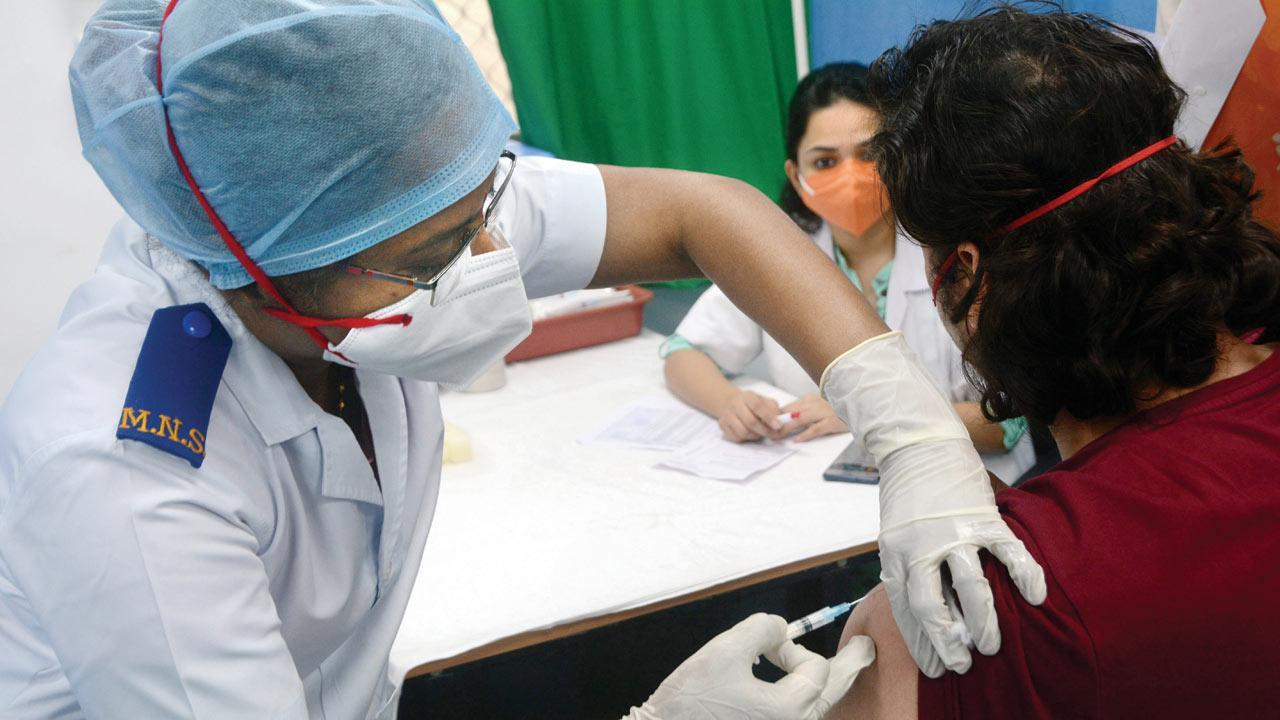Health experts say this is necessary so that those from the poorer sections of society are not denied them; also ask government to watch for black marketing and fake vaccines

Participants in the dry run at Cooper Hospital on Jan 8. Pic/Satej Shinde
Even before D-Day for vaccinations against COVID-19 dawned, health care experts had demanded that the vaccines be priced at an affordable rate for the common man. They have also asked the government to be vigilant about black marketing and fake vaccines. The state government has requested the centre to provide the vaccines free of cost to those who come from the poorer sections of society. During the initial months of the SARS-CoV2 - COVID-19 pandemic, certain medicines were sold in the black market for as much as ' 80,000.
ADVERTISEMENT
Dr Ketan Vagholkar, professor of surgery at D Y Patil Medical College, said, “The vaccine must be subsidised so that no section of society is denied it. If the vaccine is affordable it will be easily administered to large families especially in the economically under privileged sections. The second issue which needs to be addressed is adequate availability and accessibility of the vaccine in all regions, unlike that for remdesivir. Regulatory authorities also need to monitor that only genuine vaccines are administered and duplication is strictly avoided.”
Dr Wiqar Shaikh, senior allergy and asthma specialist, and professor of medicine at Grant Medical College and Sir J J Group of Hospitals expressed concern at the announcement by a manufacturer that its COVID-19 vaccine would cost R1,000. Dr Shaikh said, “The vaccine has been purchased by the government of India from the Serum Institute for healthcare and frontline workers for approximately R200 per dose, but they will be provided it free of cost. In the USA and Europe, all COVID-19 vaccines are to be administered free of cost irrespective of the sale price.”
Dr Shaikh said the pandemic has adversely affected India and its population, be it economy, jobs, health, etc. So it would be imperative for the government to consider the vaccine free of cost for the entire population, particularly those below the poverty line, economically backward sections and in the rural and semi-rural areas.
Warning for government
Dr Shaikh explicitly warned about the possibility of black marketing of the COVID-19 vaccine and asked the government to put in place appropriate measures against this. He also warned about the possibility of fake vaccines being marketed.
Dr Dinesh Thakare, medico-socio legal activist, said, “Availability of the COVID-19 vaccine at the lowest possible rate is the need of the time. During the pandemic, authorities capped the rates of RT-PCR tests, rapid antigen tests, hospital charges per day, ICU charges per day, etc. without calculating whether the rates were really viable. They warned hospitals not to make profits for the sake of humanity and sent auditors to check whether they were ‘looting’ COVID and non-COVID patients. On the other hand, they didn’t cap the prices of essential drugs used during the pandemic. The same is being repeated.
Authorities are expecting healthcare professionals and workers to administer the vaccines in the near future free of cost without legal immunity. But they are likely to be held liable if a vaccine receiver goes to the judiciary for compensation or so, claiming negligence.”
He added, “On the other hand, the authorities are not regulating the price of vaccines so as to make them affordable to the general public. The vaccine manufacturers and their known and unknown allies are making money (in millions of rupees) and are not liable because of some sort of disclaimers they printed on the package of the vaccine. Can someone think of a reasonable explanation?”
‘Appoint health regulator’
Dr Subhash Hira, professor of Global Health at the University of Washington-Seattle said, “The government procurement price of R200 per dose for Covishield (the Oxford-Astra Zeneca vaccine) manufactured by Serum Institute is higher than the Rs 160 procurement price of the Astra Zeneca-Oxford vaccine for EU countries. Moreover, Bharat Biotech’s Covaxin’s government purchase price of Rs 295 is certainly higher as it is an indigenous vaccine developed in partnership with NIV-ICMR and the Department of Biotechnology.
The private health sector is uncertain of the MRP of these vaccines at this stage. Nevertheless, these logistic concerns can be checked by the government by appointing a central health regulator who can address all emerging issues of the health sector, including the informed consent, vaccine prices, their adverse effects, etc. in a transparent manner.”
 Subscribe today by clicking the link and stay updated with the latest news!" Click here!
Subscribe today by clicking the link and stay updated with the latest news!" Click here!






